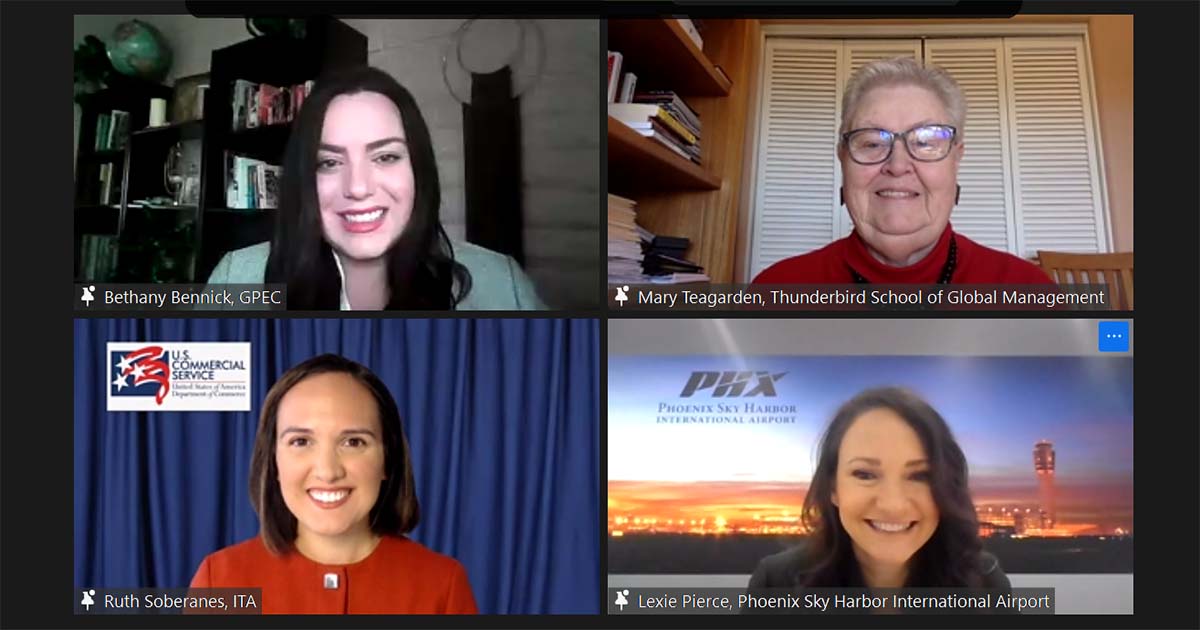

Ambassador Event: International Insights
Published: 10/26/2021
Updated: 10/28/2021
Foreign direct investment is key for Greater Phoenix’s economic future
Greater Phoenix’s growth within advanced industries has created a greater need for international partnerships. Foreign direct investment (FDI) helps attract jobs, build strong industry clusters, enhance innovation and contribute to economic stability.
In 2017, Greater Phoenix became the center of a 10-year regional plan of strategies and tactics to secure FDI and ensure agility and adaptability as the market grows.
Community leaders joined a Greater Phoenix Economic Council ambassador event to discuss the importance of FDI and how the local economy is projected to grow as international investment increases.
Panelists included:
- Lexie Pierce, Air Service Development Manager, Phoenix Sky Harbor International Airport
- Ruth Soberanes, International Trade Specialist, U.S. Commercial Service
- Mary Teagarden, Deputy Dean, Thunderbird School of Global Management
- Moderator: Bethany Bennick, Senior Manager of Domestic and International Engagement, Greater Phoenix Economic Council
GPEC’s international business attraction efforts will be aided through a newly established partnership with the Thunderbird School of Global Management.
“We will partner together with their centers of excellence all over the world and our various target markets,” said Bennick. “We're going to launch four pilots, alongside each country's manager to develop workshops, digital trade missions and connection opportunities to meet with companies looking to expand in the U.S.”
“The region is growing in the absolute right direction for the future,” Teagarden said. “I think we will end up being one of the world’s cosmopolitan showcase cities for how to get global right.”
International trade through Greater Phoenix
In 2020, $19.7 billion of goods were exported from the state and exports from Arizona companies supported more than 95,000 jobs, Soberanes said.
More than 122,000 jobs were supported by majority foreign-owned affiliates, and 22% of all exports were from small- to mid-sized companies.
Top investors in the state come from Canada, Germany, Japan, Switzerland and the U.K., and leading sectors include software, IT and business services.
With the expansion of TSMC into Phoenix, an increase of business interest out of Taiwan and other Southeast Asian countries has emerged. Forty-five semiconductor companies, a majority of which are TSMC suppliers, are actively evaluating Greater Phoenix for investment. These projects represent more than 12,000 potential phase-1 jobs and $65.6 billion in capital investment. Coupled with Intel’s $20 billion investment to build two new fabs in Chandler, Ariz., Greater Phoenix is poised to become the leading hub for U.S. chip production.
“It's not just the investment of that one business itself,” Soberanes said. “It's the opportunity of additional companies that are there to support TSMC but also want to capitalize on their investment here and do business with them.”
Global Mindset Inventory
Teagarden, who has studied FDI for more than 30 years and works with companies considering international expansion primarily from Latin America and Southeast Asia, found an important piece of the successful international expansion puzzle when working with a leader of a manufacturing plant in Mexico.
The business leader was highly successful in Hermosillo, prompting the company to charge him with leading its Chinese expansion. It failed and he was replaced.
“We sat down and looked at what made him successful in one place versus the other,” Teagarden said. “What emerged (was) cultural literacy. Your ability to understand the subtle, nuanced differences in cultures.”
In Mexico, it was easier to connect with employees, understand the intricacies of social tact and know the appropriate cultural behaviors. In a vastly different environment, those efforts were unsuccessful.
Thunderbird developed the Global Mindset Inventory, an approach based on three key areas:
- Intellectual know-how: knowledge of the business and industry
- Social know-how: cultural literacy
- Psychological capital: confidence one has as a leader in a new setting
“The soft stuff is the hard stuff. Being able to do cross-cultural communication. Being cross-culturally literate is one of the keys to success in foreign direct investment,” Teagarden said. “When you’re thinking about your deals, make sure you have somebody on your team who has cross-cultural insights or develop those insights yourself to really enhance the likelihood that you will be successful.”
Routing Phoenix on the map
As domestic and international travel has picked up, Phoenix Sky Harbor International Airport has been a trend-setter. Ten airlines have added 48 markets during the pandemic, and the airport is up to 502 average daily departures to 119 destinations, including daily, direct flights to London, Pierce said.
The market leads the country in passenger recovery coming out of the pandemic.
Phoenix-Mesa Gateway Airport, of which Sky Harbor is a part-owner, also added routes during the pandemic and progressed on SkyBridge Arizona, the country’s only joint U.S.-Mexican customs facility.
These key facets, along with cost-effective operations for carriers operating in the market, have played a role in putting Phoenix on the map. The region has also benefited from the shift in aircraft supply.
Prior to COVID-19, there was a scarcity of aircraft. Now, there may be an opportunity due to airlines not returning immediately to prior frequencies.
Pierce said the airport is gathering data to provide a strong rationale for additional international routes to be opened through Greater Phoenix.
Sky Harbor must show that there is enough demand for more airlines to serve direct international flights.
“The fact that we are seeing international companies, foreign direct investment, all of that coming to Phoenix … it’s numbers that will produce traveling executives who will fly all around the world,” Pierce said.
Meet the panelists:
- Lexie Pierce, Air Service Development Manager, Phoenix Sky Harbor International Airport
- Ruth Soberanes, International Trade Specialist, U.S. Commercial Service
- Mary Teagarden, Deputy Dean, Thunderbird School of Global Management
- Moderator: Bethany Bennick, Senior Manager of Domestic and International Engagement, Greater Phoenix Economic Council